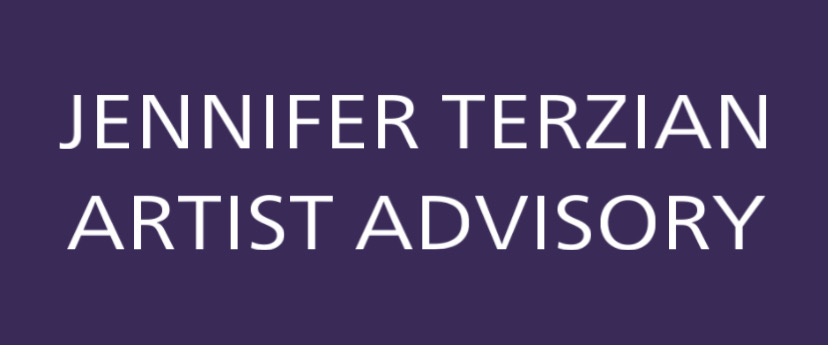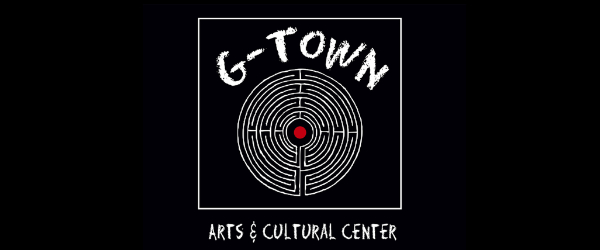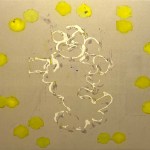“When I open my eyes in the morning, I take my phone, and check to see if Chernivtsi has been bombed.”

Contributed by Julia Kunin / On March 19, I had the opportunity to interview the Ukrainian artist Violetta Oliinyk. She has been working with her partner, artist Taras Polataiko, in Chernivtsi, Ukraine, sending medical supplies and protective gear to the civilian soldiers of Kyiv.
Violetta Oliinyk: Each day I call my brothers who are volunteer soldiers, see how they are, what is going on, and ask what they and other civilian defenders need. One brother is fighting near Kyiv and the other is farther East. After that we call shops in Europe that might be able to deliver supplies to us. They all have different problems on the borders. Everyday looks like this. I didn?t get any sleep last night because I went to the railway station early in the morning to send some supplies to Lviv.
Julia Kunin: Was it risky?
VO: I went at 6 a.m., during the curfew, so I had to find some soldier or policeman who would give me the password of the night. If you are out and don?t know this password, you will be detained. Participating in EuroMaidan in 2013?2014 [a months-long protest in Kyiv against the then-Russian leaning government] helped me to not be afraid, because the police were our enemy and I learned not to fear people with guns. But now the police are our friends, finally. They are doing everything they can in this moment for Ukraine. It?s very strange.
Sometimes I make the delivery with a private car, but today I waited for the train and met a woman train attendant and told her that I needed to deliver a box to my brother near Kyiv. She decided to take it and drop it off in Lviv, where a boy will pick it up and bring it to his home, where he receives all of our boxes. If some people are going to Kyiv, they pick it up from him, and take it to my brother.
JK: Is this the way you?ve been doing it, working with the same group of people?
VO: Each day we need to find new people who are travelling to different cities. Normally the postal service in Ukraine works well but now it can take two weeks to deliver anything, or the mail truck could be destroyed en route by Russian bombing. In the first three days after we arrived, we thought the war would end soon. I contacted people on Twitter and learned that the civilian defense soldiers did not have any medical supplies or enough protective gear. Then we started to buy supplies from Poland and other countries using Taras? credit card. We posted what we needed on Twitter. There are many Ukrainians in Europe that want to help. My mom is helping us from Poland. Now it?s like this.
I want to say also how our transportation of supplies started. I knew that my brothers would fight if war broke out. They had been thinking about it for a long time because they were at EuroMaidan and were traumatized by it. My younger brother was only 15 years old. The older one was 19. When the Maidan was over and Russia invaded the East of Ukraine, he went to war. My 19-year-old brother was a soldier but my younger brother did something like I?m doing now. At 15, he didn?t have a driver?s license, but learned how to drive supplies from Chernivtsi to the East. At the time, not many people thought about making such deliveries. Now all the Ukrainians know they must help our defenders. In 2014, it was very unsafe because the Russians would jam the GPS system. Now he?s older and he?s a volunteer soldier. When the war started, I couldn?t get in touch with my brothers. I didn?t know what to do, so for the first three days Taras and I helped refugees who were arriving in Chernivtsi from Kyiv and from the East. Everyday it?s getting worse.
First the situation in Kyiv is getting worse because it?s near Belarus and many civilian volunteers are headed there (to Kyiv). Now the worst situation is in Mariupol because the Ukrainian soldiers are trapped in the city and they can?t get any help from us. Today I spoke with a solider who is in Mariupol. They have internet. They don?t have electricity and are running their cell phones from generators. I asked how I can help because I know people there. Civilians in Mariupol tell me the soldiers are sharing their food with them, but there are 400,000 people in Mariupol.
JK: Did your friend tell you how you can help?
VO: He told me the only way we can help is to close the sky. There is no way to send anything. The Russians are bombing from the East, from warships on the sea of Azov, and from Russian territory. We have troops in Volnovakha [north of Mariupol] where the fighting is now concentrated, but they can?t get from Volnovakha to Mariupol because the Russians are bombing the area from the sky, sea and by artillery fire. A few days ago, we tried to fly to Mariupol with helicopters, but they had to turn around because of intense shooting. If you want to leave Mariupol, there are Russians on the road. They take your car, see what you have, ask you to strip and inspect you for tattoos. If you have any Ukrainian tattoos, you will be tortured and possibly killed. The situation is similar to 2014 when people were tortured and killed for having Ukrainian tattoos. If you leave Mariupol you risk dying in the 15 kilometers between Mariupol and the next city. If you want to go to Mariupol, you can?t. No Ukrainian soldiers, no press and no humanitarian aid can get there
JK: It?s so awful. I hope Ukraine can get more air defense supplies. It?s important for people to get the message out about Mariupol. How is daily life in Chernivtsi?
VO: In my town life looks like normal but we have another sense of time. One moment we feel like years have passed, and then the next moment it feels like it?s been only three days. You don?t have normal weekends or a normal night?s sleep. You have lots of adrenaline and you don?t know what is going on. All Ukrainians are feeling like this. There are a lot of police in the city. Sirens go off when a missile or fighter jet flies near or is shot down near Chernivtsi. Then the entire city needs to take shelter in basements.
JK: And during the day are cafes open? Are people going to work?
VO: Yes, because we need the economy to work. People are trying their best to live normal lives even though it?s not normal. We also don?t have enough gasoline. Taras and I bought a little gasoline that we are keeping in the garage for Molotov cocktails and other emergency purposes. Now we don?t use our car because gasoline is hard to find.
JK: Do you have friends that you are in touch with daily?
VO: We see one of our friends, Maria, who volunteers by transporting medicine from Romania to our storeroom. She then distributes it to those who need it. She gives some to us so that we can send it to the civilian defense forces. We send supplies often by train to Kharkiv, Sumy, Chernihiv, and other cities that have a shortage of food and medical supplies.
JK: When you say we, do you mean lots of people?
VO: There are lots of volunteers. We are also in touch with other people who were volunteering back in 2014 and are now doing lots of work. We help each other, but we are just in contact by phone or online.
JK: It must be hard to do this every day, you?re very brave. Do you have a plan to leave if you need to?
VO: I don?t want to leave Ukraine, but Taras?s elderly parents are here, and we would need to take them out of Ukraine if things got very bad. I think we can go to Romania because its 40 kilometers from Chernivtsi.
JK: Your generation has tremendous hope and optimism. Do you think your generation is different because of what you grew up with?
VO: In Ukraine every generation has known Russian atrocities. Taras?s mom and dad experienced it throughout their youth and adulthood. Taras did as well in his youth, but managed to escape to Canada. There was a constant fear of getting arrested. Members of Taras?s family were arrested and deported to uranium mines in Kazakhstan in the late 1940s. All of my grandparents? private property was confiscated.
JK: is there anything else you want to tell us about what you do every day.
VO: In our normal life we often drive to the forest, go swimming on the Pruth River, and go to our studios. We also have our own garden on the outskirts of town. But now we can?t do any of that. We don?t see any movies, any television. We don?t have time and we don?t have the concentration. In order to relax, I take care of my plants. I have here my backpack with all of my documents, food supplies, warm clothes. ready in case we need to leave in a hurry with our two cats. During the first days of the war, we just ran to Taras?s parents? basement. It?s very hard because we live in the attic of a building, so we are really exposed.
JK: So you?re spending all of your time calling, ordering, sending?
VO: 24/7, day and night.
I asked Violetta about her artwork.
JK: Was any of your performance art related to your activism?
VO: Yes. Last summer I did a series of site-specific performances about the history of Chernivtsi and the ways various occupations in the 20th century, ruined its cultural heritage; The Soviets in 1944?1991 and before that the Romanian fascist regime. Many markers of the European cultural heritage of Chernivtsi were altered or destroyed at that time. There are big gaps in collective memory and cultural continuity of our city. Each occupation was erasing the past. I?m interested in restoring it.
JK: That?s really important and inspiring work. Thank you so much for speaking with me. I have great admiration for what you are doing.
Please send donations to Violetta via Paypal at flotilla.my@gmail.com. If you would like to send money to Taras please message Taras Polataiko on Facebook.
About the author: Brooklyn artist Julia Kunin was a Fulbright Scholar to Hungary in 2013 and she received a 2010 Trust for Mutual Understanding Grant to Hungary. She has received a Pollock-Krasner Foundation Grant and had a residency at Art Omi. Recent solo shows include ?Rainbow Dream Machine? at McClain Gallery, Houston (2021-2022) and ?Mechanical Ballet? at Kate Werble (2021-2022).
Related posts:
Interview with Taras Polataiko, an artist who returned to Ukraine, part 1
Interview with Taras Polataiko, an artist who returned to Ukraine, part 2

























Julia, Thank you for this, your interviewie Violeta is very courageous as are so many Ukrainians. It is so heartbreaking to hear what is going on. Six months ago this was all unthinkable. We’d all like to know more what we can do here so far away from this carnage to possibly help. Thanks again, Julia